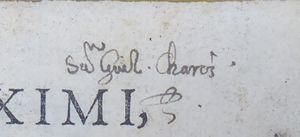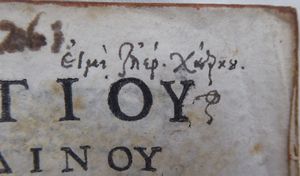Difference between revisions of "William Chark d.1617"
m (link) |
|||
| (11 intermediate revisions by 3 users not shown) | |||
| Line 1: | Line 1: | ||
__NOTITLE__ | __NOTITLE__ | ||
| − | ===[[name::William]] [[name::CHARK]] d.[[date of death::1617]]=== | + | ===[[name::William]] [[name::CHARK]] or [[name::CHARKE]] d.[[date of death::1617]]=== |
====Biographical Note==== | ====Biographical Note==== | ||
| − | BA [[education::Peterhouse, Cambridge]] 1563; MA and [[occupation::fellow of Peterhouse, Cambridge|fellow]] 1566; expelled 1573, for preaching a controversial sermon against episcopacy. Became [[occupation::chaplain]] to [[associates::Lord Cheney]], and to the [[associates::Duchess of Somerset]]; [[occupation::preacher to Lincoln’s Inn]] 1581-93, when he was suspended for his puritan views. Published a number of anti-Jesuit tracts in the early 1580s. Died, and buried, in London. Surviving letters from Chark to [[associates::Abraham Ortelius]] from the 1580s refer to the search for, supply and exchange of books. | + | BA [[education::Peterhouse, Cambridge]] 1563; MA and [[occupation::fellow of Peterhouse, Cambridge|fellow]] 1566; expelled 1573, for preaching a controversial sermon against episcopacy. Became [[occupation::chaplain]] to [[associates::Lord Cheney]], and to the [[associates::Duchess of Somerset]]; [[occupation::preacher to Lincoln’s Inn]] 1581-93, when he was suspended for his puritan views. Published a number of anti-Jesuit tracts in the early 1580s. Died, and buried, in [[location::London]]. Surviving letters from Chark to [[associates::Abraham Ortelius]] from the 1580s refer to the search for, supply and exchange of books. |
====Books==== | ====Books==== | ||
| − | Chark had a significant library which is not now well documented; it appears to have been dispersed soon after his death and Chark books can now be found in many historic collections around the UK and further afield. He owned a number of manuscripts, including two early [[language::Greek]] Biblical manuscripts (Codex Leicestrensis and Codex Montfortianus), and 5 manuscripts subsequently owned by [[ | + | Chark had a significant library which is not now well documented; it appears to have been dispersed soon after his death and Chark books can now be found in many historic collections around the UK and further afield. He owned a number of [[format::manuscript|manuscripts]], including two early [[language::Greek]] [[subject::theology|Biblical]] [[format::manuscript|manuscripts]] (Codex Leicestrensis and Codex Montfortianus), and 5 [[format::manuscript|manuscripts]] subsequently owned by [[crossreference::Robert Cotton 1571-1631|Cotton]]. At least 150 printed books of his can be traced today; there undoubtedly are, or were, many more. Examples: British Library 1197.a.12, C.74.c.7; Bodleian Library V1.1.Th.Seld., 8o.H.40.Art.Seld., Cambridge UL H*.4.29, F*.11.18, Durham UL Cosin A.V.9, and many others; National Library of Scotland K.34.f; Westminster Abbey P.5.5, and many others. |
====Characteristic Markings==== | ====Characteristic Markings==== | ||
| − | [[File: | + | [[file:P1090670(1).JPG|thumb|William Chark's typical Latin inscription]] |
| + | [[File:CharkWilliam2.jpg | thumb | Greek inscription of William Chark (Durham UL Cosin R.5.26 G. Codinus, ''Selecta de originibus Constantinopolitanis'', Heidelberg, 1596) ]] | ||
Chark commonly inscribed his books “Sum Guil. Charci”, or, in his Greek books (of which he had many), in Greek; he sometimes added a price or date of acquisition, and used flyleaves for notes. His tract volumes sometimes have multicoloured leaf edges. | Chark commonly inscribed his books “Sum Guil. Charci”, or, in his Greek books (of which he had many), in Greek; he sometimes added a price or date of acquisition, and used flyleaves for notes. His tract volumes sometimes have multicoloured leaf edges. | ||
| Line 15: | Line 16: | ||
<div id="sourcelist"> | <div id="sourcelist"> | ||
*Greaves, Richard L. '[https://doi.org/10.1093/ref:odnb/5142 "Charke, William (d. 1617), religious controversialist]'." Oxford Dictionary of National Biography". | *Greaves, Richard L. '[https://doi.org/10.1093/ref:odnb/5142 "Charke, William (d. 1617), religious controversialist]'." Oxford Dictionary of National Biography". | ||
| − | *J. | + | *Hessels, J. (ed), ''Ecclesiae Londino-Batavae archivum … Abrhami Ortelii … epistulae'', Cambridge, 1887 |
| − | * | + | *Rendel Harris, J. ''The origin of the Leicester Codex of the New Testament'', Cambridge, 1887, 33-45 |
{{DEFAULTSORT:Chark, William}} | {{DEFAULTSORT:Chark, William}} | ||
[[Category:Clergy]] | [[Category:Clergy]] | ||
| − | |||
[[Category:Academics]] | [[Category:Academics]] | ||
| + | [[Category:All Owners]] | ||
Latest revision as of 06:51, 27 March 2022
William CHARK or CHARKE d.1617
Biographical Note
BA Peterhouse, Cambridge 1563; MA and fellow 1566; expelled 1573, for preaching a controversial sermon against episcopacy. Became chaplain to Lord Cheney, and to the Duchess of Somerset; preacher to Lincoln’s Inn 1581-93, when he was suspended for his puritan views. Published a number of anti-Jesuit tracts in the early 1580s. Died, and buried, in London. Surviving letters from Chark to Abraham Ortelius from the 1580s refer to the search for, supply and exchange of books.
Books
Chark had a significant library which is not now well documented; it appears to have been dispersed soon after his death and Chark books can now be found in many historic collections around the UK and further afield. He owned a number of manuscripts, including two early Greek Biblical manuscripts (Codex Leicestrensis and Codex Montfortianus), and 5 manuscripts subsequently owned by Cotton. At least 150 printed books of his can be traced today; there undoubtedly are, or were, many more. Examples: British Library 1197.a.12, C.74.c.7; Bodleian Library V1.1.Th.Seld., 8o.H.40.Art.Seld., Cambridge UL H*.4.29, F*.11.18, Durham UL Cosin A.V.9, and many others; National Library of Scotland K.34.f; Westminster Abbey P.5.5, and many others.
Characteristic Markings
Chark commonly inscribed his books “Sum Guil. Charci”, or, in his Greek books (of which he had many), in Greek; he sometimes added a price or date of acquisition, and used flyleaves for notes. His tract volumes sometimes have multicoloured leaf edges.
Sources
- Greaves, Richard L. '"Charke, William (d. 1617), religious controversialist'." Oxford Dictionary of National Biography".
- Hessels, J. (ed), Ecclesiae Londino-Batavae archivum … Abrhami Ortelii … epistulae, Cambridge, 1887
- Rendel Harris, J. The origin of the Leicester Codex of the New Testament, Cambridge, 1887, 33-45

